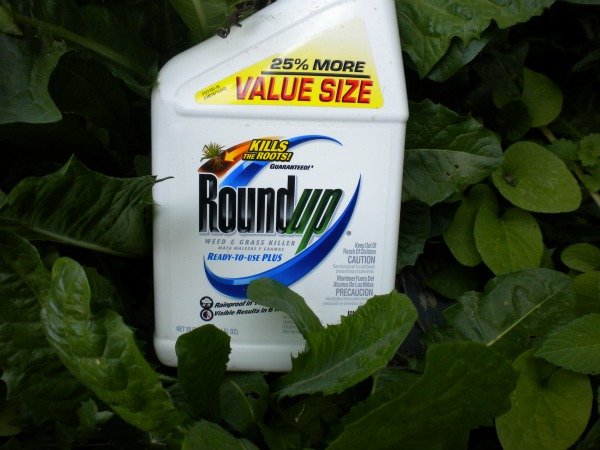
You’ve seen the commercials. All American Dad, pump sprayer in hand, attacking those pesky weeds growing in the cracks of his family’s driveway with a vengeance. He chooses Roundup, of course.
Why? Because Roundup kills weeds to the root so they won’t come back making you the laughingstock of your suburban neighborhood.
Roundup, Roundup everywhere. Most homeowners use it without a second thought. Many schools even use it, blithely spraying around planting beds and sidewalks where children walk and play, tracking its residues into classrooms, cars, homes and little bodies.
Roundup is indisputably the King of Herbicides and one of Monsanto’s most lucrative crown jewels. Not only is it widely used by consumers, it is also heavily used by industrial agriculture – more popular than any other herbicide worldwide. Its residues are found on the staple crops of the Western diet – sugar, corn, soy and wheat – and in the plethora of processed foods made with these foods as well. In particular, GMO corn and soy are heavily doused in Roundup as these crops are genetically engineered to be immune to its withering effects.
The trouble is, while Roundup is highly effective at killing weeds, it’s also proving highly effective at killing us too – slowly but surely and insidiously – via Roundup’s deadly active ingredient – glyphosate.
While the pesticide industry maintains that glyphosate is minimally toxic to humans, new research published in the Journal Entropy strongly argues otherwise by shedding light on exactly how glyphosate disrupts mammalian physiology.
Authored by Anthony Samsel and Stephanie Seneff of MIT, the paper investigates glyphosate’s inhibition of cytochrome P450 (CYP) enzymes, an overlooked component of lethal toxicity to mammals.
In the in-depth video interview below on her groundbreaking research, Dr. Seneff describes the mechanism by which the glyphosate in Roundup disrupts human biological processes.
The currently accepted view is that glyphosate is not harmful to humans or any mammals because the shikimate pathway found in plants is absent in animals. The shikimate pathway is involved with the plant’s synthesis of certain amino acids and is lethally disrupted by glyphosate.
What has been completely overlooked until now is that the shikimate pathway is present in beneficial gut bacteria, which play a critical role in human health. Gut bacteria aid digestion, prevent permeability of the gastrointestinal tract, synthesize vitamins and provide the foundation for robust immunity.
Glyphosate Disrupts the Functioning of Beneficial Gut Bacteria
In synergy with disruption of the biosynthesis of important amino acids via the shikimate pathway, glyphosate inhibits the cytochrome P450 (CYP) enzymes produced by the gut microbiome. CYP enzymes are critical to human biology because they detoxify the multitude of foreign chemical compounds, xenobiotics, that we are exposed to in our modern environment today.
As a result, humans exposed to glyphosate through the use of Roundup in their community or through the ingestion of its residues on industrialized food products become even more vulnerable to the damaging effects of other chemicals and environmental toxins they encounter!
What’s worse is that the negative impact of glyphosate exposure is slow and insidious over months and years as inflammation gradually gains a foothold in the cellular systems of the body.
The consequences of this systemic inflammation are most of the diseases and conditions associated with the Western lifestyle:
- Gastrointestinal disorders
- Obesity
- Diabetes
- Heart Disease
- Depression
- Autism
- Infertility
- Cancer
- Multiple Sclerosis
- Alzheimer’s disease
- And the list goes on and on and on …
In summary, Dr. Seneff’s study of Roundup’s ghastly glyphosate uncovers the manner in which this lethal environmental toxin gradually and inevitably disrupts homeostasis in the human body with the tragic end result of disease, degeneration, and widespread suffering.
Still want to “shoot” those weeds this weekend with some Roundup and buy those unlabeled, GMO laced processed foods in the pretty packages at the supermarket?
In addition, Roundup residue in organic hydroponics is possible as there is no transition period from conventional farming. Stick with soil based organics!
References
Glyphosate’s Suppression of Cytochrome P450 Enzymes and Amino Acid Biosynthesis by the Gut Microbiome: Pathways to Modern Diseases
Institute of Responsible Technology: Monsanto’s Herbicide–Featuring the Darth Vader Chemical
More Toxic Than Declared
More Information
Toxic Wheat
Glyphosate used on DOZENS of Food Crops
Dutch Ban Glyphosate, France and Brazil Likely to Soon Follow







We have a container of that poison crap in our garage! How DO we dispose of it?
Thanks & shared. Hopefully, none of our dear readers are using this toxic product!! 🙂
FB won’t let me edit it which is a pain.
White vinegar instead
hate round up!
How would someone go about disposing of such a dangerous chemical?!
What is the best way to dispose of these poisons?
In many parts of BC Canada, the Regional District does a “hazardous waste roundup” (no pun intended) in communities. On a certain day you can bring all your poisons, leftover paints and solvents, etc etc to the collection point. Try ‘phoning your County/ Regional District or equivalent about this.
Alternatively, you could check if the hardware store that sold them to you will take them back, but don’t give them to them unless you are sure they dispose of them responsibly!
WHATEVER you do, don’t flush them down the toilet, which just puts them into the wastewater stream, polluting rivers and oceans and fish and birds and making its way back to us!
Not tooting my own horn, but for years people been telling me to use Roundup for my weeds and I just didn’t want to. Hand pulling is a b–ch, but I don’t want to use poisons. Even more glad after all this!
no biggie
yeah, what the hell else r we suppose to eat during a depression?